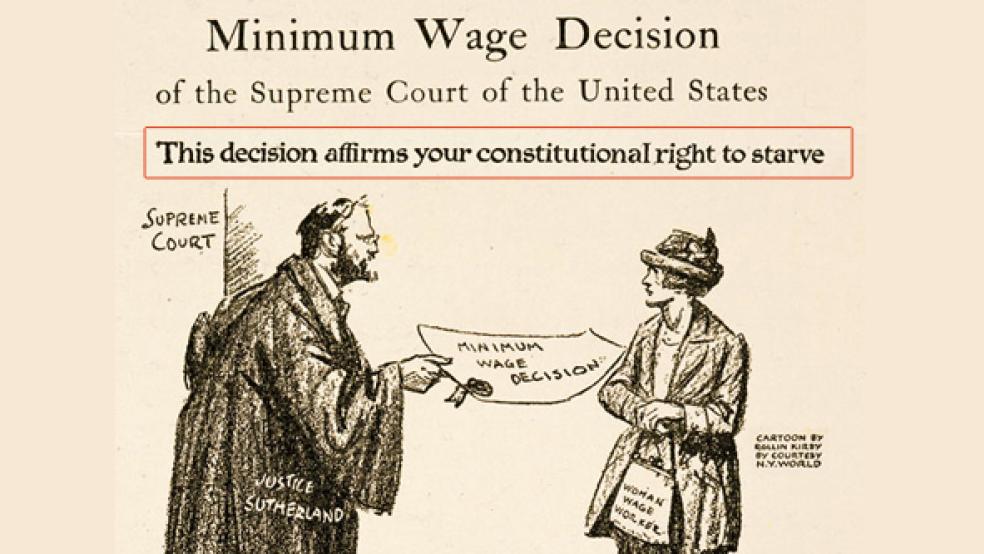President Obama's call last night to raise the minimum wage to $9 an hour and tie future increases to the cost of living was one of the few real surprises in his State of the Union address -- and one certain to rekindle a long standing controversy over the impact of higher minimum wages on the economy and business.
The federal minimum wage, the legal floor on what employers can pay their workers, is currently $7.25 an hour and hasn't been raised since July 2009. While Democrats, organized labor and liberal advocacy groups have long argued that a higher minimum wage is essential to keeping America’s workers out of poverty and increasing consumer purchasing power, business groups and their Republican allies in Congress insist that a higher minimum wage would discourage employers from expanding and hiring more workers.
House Speaker John Boehner, R-Ohio, whose family owned a bar outside Cincinnati, has long insisted that efforts to raise the minimum wage has been a detriment to small businesses, food chains and other businesses dependent on cheap labor. He has repeatedly voted against increases in the minimum wage. Last night he sat stone faced after Obama announced his plan to seek a higher minimum wage.
"We know our economy is stronger when we reward an honest day's work with honest wages," Obama told the joint session of Congress. "But today, a full-time worker making the minimum wage earns $14,500 a year. Even with tax relief we've put in place, a family with two kids that earns the minimum wage still lives below the poverty line. That's wrong.
"Tonight, let's declare that in the wealthiest nation on Earth, no one who works full-time should have to live in poverty, and raise the federal minimum wage to $9 an hour," Obama added. "This single step would raise the incomes of millions of working families."This is the first time Obama has called for a minimum wage hike as president.
Under his presidency, the 2009 increase came out of a 2007 law signed by President George W. Bush. Raising the hourly federal minimum wage to $9 from $7.25 by the end of 2015 would return it to its highest inflation-adjusted value since 1981, under President Ronald Reagan, according to a White House fact sheet. The federal minimum wage was signed into law in 1938 by President Franklin Roosevelt, at the height of the Great Depression, as an anti-poverty measure designed to stimulate a stagnate economy.
Over the years, the federal minimum wage has grown at a snail's pace, largely because of solid opposition from major business groups in Washington. Indeed, 18 states and the District of Columbia have raised their minimum wages higher than the current federal rate of $7.25 per hour. Employers are required to pay the state minimum wage or the federal minimum wage – whichever is higher.Because so few workers over the age of 25 earn minimum wage--less than 2 percent, according to the Bureau of Labor Statistics--raising it does not have far-reaching effects on the economy as a whole, as some opponents contend. However, for small business, a variety of studies suggest that higher wages can have more of an impact.
The value of the minimum wage has fallen sharply over the past forty years. In 1968, for example, the federal minimum wage was $1.60 per hour, which translates to approximately $10.27 in 2011 dollars. During the 2012 president campaign, Republican nominee Mitt Romney favored a plan to tie the minimum wage to the cost of living, In a move that put him out of step with his fellow Republicans on the campaign trail, Romney said in New Hampshire that the minimum wage should be pegged to inflation and rise with the cost of living. Obama said last night that was one point on which he and Romney agreed.
Liberal groups immediately praised the president's announcement.
"President Obama's proposal to raise the minimum wage is a giant step for the middle class," said Neera Tanden, president and CEO of the Center for American Progress. "It would help millions of people striving to enter the middle class and would strengthen the economy by increasing workers' purchasing power. Increasing the minimum wage would be especially helpful to women who comprise more than 62 percent of minimum wage workers."Lawrence Mishel, president of the Economic Policy Institute, said Obama's proposal was a welcome opening to the policy conversation that's needed about getting wages growing again, after stagnating for the last ten years among both college and high school graduates. The proposed increase will benefit 21 million workers and increase wages by $22 billion by 2012. "This will not only boost wages but facilitate greater job growth by increasing spending by low-wage workers."


